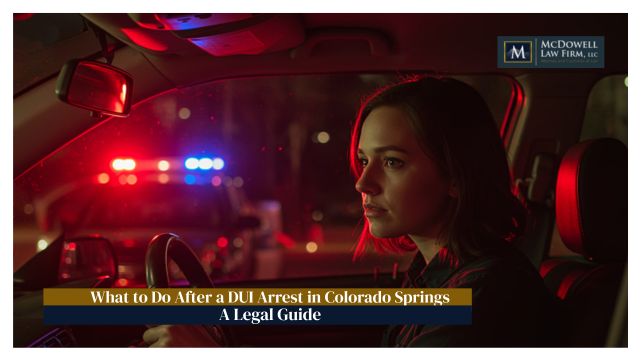DUI charges in Colorado can be an overwhelming experience. Will you go to jail? How much will the DUI cost? Will you lose your driver’s license or Will you lose your job for a DUI conviction? Will you be on probation? What Happens on a DUI Charge in Colorado?
Those are a lot of the big questions I get. People want to know what the actual step-by-step process is for a DUI or DWAI charge? What happens in court? How do I negotiate with the DA? What is a good deal in my situation?
I’ve been handling DUI cases in Colorado Springs for over 20 years. Both as a deputy DA, and since 2007, as a criminal and DUI defense lawyer. In this article, I’m going to use the Fourth Judicial District (El Paso and Teller Counties) and Colorado Springs as examples of how the process works. From the initial ticket and summons to court proceedings, negotiations, and potential trial. I’ll also cover some ways a DUI defense attorney can help you prepare for court and protect your rights.
The Ticket and Summons
A drunk driving case (DUI, DWAI, or DUI Drugs) typically begins with a traffic stop, where an officer suspects impairment due to alcohol or drugs. If probable cause is established, through field sobriety tests or observable behavior, you may be arrested and taken to jail or issued a summons.
In Colorado Springs, you will typically receive a summons (ticket) that outlines your charges and has a mandatory court date. This means that you will likely not be arrested and required to bond out of jail on a simple DUI. This process will vary county to county in Colorado. For example, in my experience, DUI charges in Teller County are much more likely to result in going to jail and requiring a person to post a bond than in El Paso County.
Another factor determining whether you are taken to jail is whether there are other charges in addition to the DUI. If you are charged with other counts, such as a felony (4th or greater DUI), vehicular assault or vehicular homicide, you will be arrested, and a bond will be set in your case.
DMV notice
If you refuse to take a chemical test, or do a breath test that results in a BAC of a .08 or greater (for adults over 21), the officer will take your license and provide a “Notice of Express Consent Affidavit and Notice of Revocation,” This EC Affidavit states that you have seven days to request a hearing with the Colorado Department of Revenue to contest the automatic revocation of your driver’s license. Failing to act within this window results in an automatic revocation.
Note: This is for refusals to cooperate in chemical testing and for breath tests. On blood tests, they will not issue the EC affidavit because they won’t know the results of your blood test until the results come back from the lab. This can take weeks or months, depending on the lab’s backlog.
DMV Hearing: Administrative Proceedings
Separate from the criminal case, the administrative process addresses your driving privileges. Requesting a DMV hearing within the required time is essential. If you miss the deadline to request the hearing, you essentially “forfeit” the ability to contest the license revocation. The DMV hearing focuses solely on whether your license should be revoked (suspended), based on factors like blood alcohol content (BAC) levels or refusal to submit to chemical testing. An experienced DUI attorney can represent you at this hearing, challenging the evidence and potentially preserving your driving rights.
Your First Court Appearance
The first appearance in Colorado Springs is at the El Paso County Combined Courts, the Terry R. Harris Building, located at 270 S. Tejon, in downtown Colorado Springs. You will appear in room W119, the appropriately named First Appearance Center, or “FAC”. In Colorado Springs, arraignments for DUI cases are typically scheduled within 30 to 60 days post-arrest.
- If you are pro se: The DA will call you back into an office to briefly discuss your case and typically make an initial offer (plea bargain) in your case. You can accept the offer and set the case for sentencing, or you can set it for another court date, called a pre-trial conference in court.
- If you have an attorney: The attorney will contact the Court before your date, and change your appearance date. In Colorado Springs, your attorney may appear for you at this first court date in the FAC. They will present mitigating evidence/information and discuss with the DA ways to resolve your DUI charges in a favorable manner. It’s advisable to have legal counsel at this stage to understand the implications of your plea fully.
Pre-Trial Motions and Discovery
Your next court date is called a pretrial conference or disposition date. Before this date, you can obtain “discovery” in your case. This is the evidence that will be used against you in court: police reports, dashcam/bodycam, 911 calls, chemical test results, and witness statements. Your attorney may file pre-trial motions to suppress evidence if there were legal or procedural errors during your arrest, such as improper traffic stops or mishandling of chemical tests. Successfully suppressing key evidence can significantly weaken the prosecution’s case, sometimes leading to reduced charges or even dismissal.
Plea Negotiations
Many DUI cases are resolved through plea bargaining, where the defense and prosecution agree on a reduced charge or lighter sentence in exchange for a guilty plea. Factors influencing plea deals include the strength of the evidence, prior offenses, and other mitigating circumstances. A DUI lawyer can negotiate favorable terms, potentially reducing a DUI to a lesser offense like DWAI (Driving While Ability Impaired), a deferred sentence, or another plea arrangement that is beneficial to the client
Trial: Contesting the Charges
If a plea agreement isn’t reached, the case proceeds to trial. Here, both sides present evidence and question witnesses before a judge or jury. The prosecution must prove guilt beyond a reasonable doubt. Your defense may challenge the validity of the traffic stop, the accuracy of BAC tests, or the credibility of officer observations. A skilled attorney will craft a defense strategy tailored to the specifics of your case.
Sentencing: Plea bargain or Conviction
If your case was dismissed, or you were found not guilty at trial, you can stop reading here. Congratulations!
However, if you have accepted a plea agreement, this next part is very important. A plea bargain will require you to complete stay out of trouble, and complete you will know the majority of terms in your case. The agreement may leave some things open to the court, such as length and type of probation, fines and monitored sobriety. Other terms , such as alcohol and drug treatment will be based on the recommendations of the alcohol evaluation.
However, if you go to trial, and are convicted, the Judge will determine your sentence. The Judge will sentence based on factors like BAC level, prior offenses, and whether any aggravating circumstances were present (e.g., accidents or minors in the vehicle). Penalties may include:
- Fines: Up to $1,000 for a first offense.
- Jail Time: 5 days to 1 year for a first DUI.
- License Revocation: Up to 9 months for a first offense. If there are no other suspensions/revocations on your license, you will be eligible for early reinstatement with an interlock device, SR-22 and other conditions.
- Probation: Including mandatory alcohol education, community service and a MADD victim impact panel.
How a DUI Attorney Can Help
Navigating a DUI charge without legal representation can be daunting. An experienced DUI attorney offers invaluable assistance by:
- Protecting Your Rights: Ensuring law enforcement procedures were lawful and challenging any violations.
- Analyzing Evidence: Scrutinizing the prosecution’s case for weaknesses or inconsistencies.
- Negotiating Plea Deals: Leveraging relationships and knowledge to secure favorable outcomes.
- Representing You in Court: Presenting a robust defense and advocating on your behalf.
In Colorado Springs, where DUI laws are stringently enforced, having a dedicated attorney can make a significant difference in the trajectory of your case. From preserving your driving privileges to potentially reducing or dismissing charges, legal counsel is an investment in your future stability and peace of mind.
Note: This article is for informational purposes only and does not constitute legal advice. For personalized guidance, consult a qualified DUI attorney.




